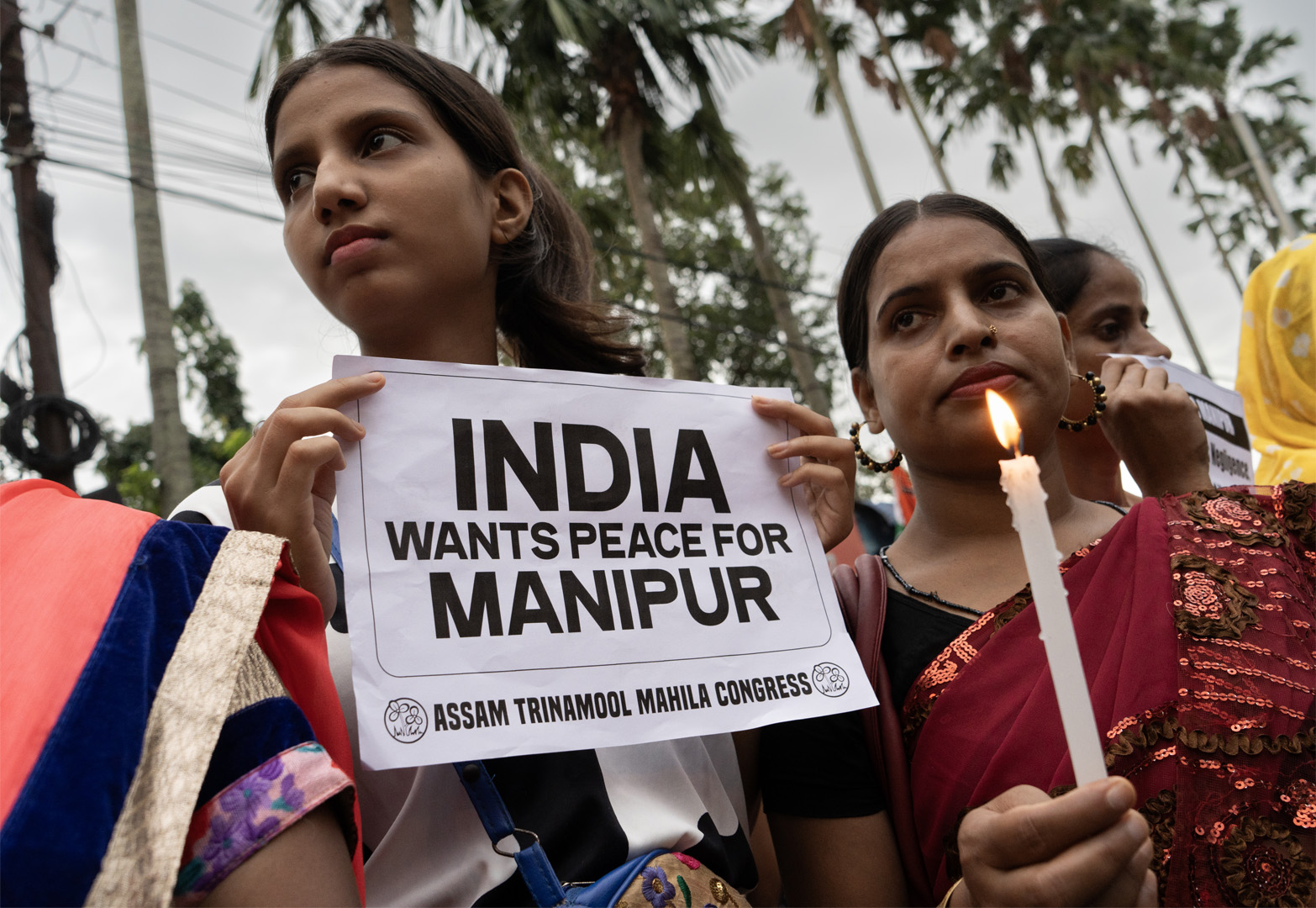Manipur hides a simmering conflict between several ethnic groupings under its stunning scenery and rich cultural variety. Deep mistrust and socio-political animosities characterise the continuous conflict between the Meiteis and Kukis, which offers a complex dilemma that calls for a comprehensive understanding. The security of India is seriously threatened by the intricate web of internal conflict that exists beneath the surface, which is made worse by the lethal trinity of insurgency, drugs, and illegal infiltration.
The legacy of British colonial policy, which purposefully sowed the seeds of separation, can be linked to the origins of the ethnic conflicts in Manipur. The British’s takeover of Manipur in 1891 and their involvement in what the Nagas refer to as “the planting of the Kuki tribe” exacerbated tensions. Territorial disputes and power struggles began to emerge around this time, with the Nagas claiming that the Kuki people did not have any land in Manipur until the British “planted” them on Naga hills between 1830 and 1840.
The struggle over land and natural resources lies at the heart of this multidimensional war. The Meiteis and Nagas, two indigenous tribes, are vehemently defending their territory and sense of self, while the Kukis are asserting their claim to hill lands where village chiefs are regarded as landowners.
There are considerable differences in these groups’ interpretations of the complex nuances of land ownership and inheritance. While the Kukis have a current claim to land in the Imphal Valley and other areas of India, the Meiteis and Nagas have historical ties to their own homelands.
The border between India and Myanmar has become Manipur’s main source of worry in recent years. Waves of immigrants from Myanmar have historically flooded the area, especially during military takeovers in 1962, 1988, and most recently in 2021. Around 40,000 citizens of Myanmar had entered Mizoram by June 2023. The same thing happened in Manipur when a committee under the direction of the Minister of Tribal Affairs and Hill Development Letpao Haokip quickly located 2,187 illegal immigrants.
According to Khaidem Mani, the acting chair of the Manipur Human Rights Commission, the unchecked influx of unauthorised immigrants raises concerns about giving anti-national organisations a foothold in the area. Notably, this invasion of Myanmar Chin-Kuki people has sparked tensions with the local populace, resulting in confrontations like the Naga vs. Kuki war (1992–1999), the Kuki vs. Paite conflict in Manipur (1997–1998), and the Kuki vs. Karbi struggle in Assam (2003–2004).
Notably, this invasion of Myanmar Chin-Kuki people has sparked tensions with the local populace, resulting in confrontations like the Naga vs. Kuki war (1992–1999), the Kuki vs. Paite conflict in Manipur (1997–1998), and the Kuki vs. Karbi struggle in Assam (2003–2004).
Thanglian Pau Guite is the leader of the ZRA, which plays a key role in Manipur’s drug trade. Guite, a former Zomi National Congress (ZNC) general secretary and elected member of parliament in Myanmar, now resides in the Churachandpur district of Manipur, using a different name. The ZRA serves as a parallel government in this area, collecting taxes and ensuring the safety of travellers.
To finance their operations, the ZRA militants use large poppy plantations and traffic in drugs, which fuels violence and instability in Manipur. The extent of this problem is shown by journalist Rajeev Bhattacharya, who points out that from March 2017 to June 2023, drugs and narcotics worth 4,602 crore were seized on the foreign market. Following the discovery of 40 crore worth of opium in Delhi on August 20, investigations revealed an interstate narcotics cartel connected to Churachandpur. These cartels source their raw materials from the highland regions close to Manipur and Myanmar’s international borders.
In addition to endangering India’s national integrity, the hazardous combination between militants and drugs also retards social and economic advancement. The rush of asylum seekers fleeing the unrest in Myanmar complicates matters.
These defenceless people are exposed to insurgency exploitation because India is not a signatory to the 1951 UNHCR Convention on Refugees. They serve the dual function of supplying a workforce for drug production and extending instability by being forced into poppy farming as a source of inexpensive labour.
Opium poppy farming in Manipur is a major factor in the conflict and not only an economic activity. This connection between the Kuki insurgency and the drug cartels poses a significant difficulty. As warned by the then Additional Director General of Police, Clay Khongsai, during a significant campaign against poppy planting, the opium trade strengthens their financial resources, supporting subversive actions and prolonging the cycle of bloodshed.
Manipur’s heavy poppy farming has negative environmental effects as well. The soil, water, woods, marshes, rivers, and other natural resources that make up the region’s ecosystems and biodiversity are seriously threatened by large-scale poppy plantations. These environmental problems are being made worse by the effects of climate change. Therefore, as stressed by environmental activist Ram Wangkheirakpam, immediate action is required to reclaim and rehabilitate deforested lands in order to reduce violence and bring life back to these forests.
A bleak picture is painted by the worrying numbers. Between 2010 and 2021, Manipur lost more than 46,000 hectares of essential primary forest, according to Surjakanta Sarangthem and Dr. Anand Kumar. The most damage was done to Churachandpur district, which lost 64,000 hectares of forest cover. The area has become a centre for opium cultivation as a result of the ZRA’s progressive extension of the ‘Golden Triangle’ territories along the border between Myanmar and Manipur, which has made the drug trade easier to access.
Although identity politics and disputes over land and resources are the main drivers of the Meitei-Kuki conflict and the Kuki people’s demand for a separate government, the conflict cannot be fully understood without taking into account infiltration, the spread of drugs, and the insurgents that control it. This intricate interplay highlights the urgent need to address the underlying causes of the violence in Manipur and poses a serious danger to India’s national security.
A comprehensive strategy that includes social and political dialogue, the swift deployment of the National Register of Citizens (NRC), and strict law enforcement is required to address this complex issue. Manipur’s stability depends on effective cooperation between the state, the federal government, and the local population. Manipur’s picturesque landscapes will only genuinely blossom under such concerted efforts, free from the gloom of ethnic conflict, insurgency, and narcoterrorism.


Add a comment







